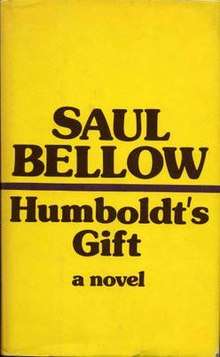Humboldt's Gift
 | |
| Author | Saul Bellow |
|---|---|
| Cover artist | Mel Williamson[1] |
| Country | United States |
| Language | English |
| Publisher | Viking Press |
Publication date | 1975 |
| Media type | Print (Hardcover & Paperback) |
| Pages | 487 |
| ISBN | 0-670-38655-3 |
| OCLC | 1339692 |
| 813/.5/2 | |
| LC Class | PZ3.B41937 Hu PS3503.E4488 |
| Preceded by | Mr. Sammler's Planet |
| Followed by | The Dean's December |
Humboldt's Gift is a 1975 novel by Canadian-American author Saul Bellow. It won the 1976 Pulitzer Prize for Fiction and contributed to Bellow's winning the Nobel Prize in Literature the same year.
Plot
The novel, which Bellow initially intended to be a short story, is a roman à clef about Bellow's friendship with the poet Delmore Schwartz. It explores the changing relationship of art and power in a materialist America. This theme is addressed through the contrasting careers of two writers, Von Humboldt Fleisher (to some degree a version of Schwartz) and his protégé Charlie Citrine (to some degree a version of Bellow himself). Fleisher yearns to lift American society through art, but dies a failure. In contrast, Charlie Citrine makes a lot of money through his writing, especially from a Broadway play and a movie about a character named Von Trenck – a character modeled after Fleisher.
Another notable character in the book is Rinaldo Cantabile, a wannabe Chicago gangster, who tries to bully Citrine into being friends and whose career advice to Citrine, focused solely on commercial interests, is the opposite of the advice which Citrine had once received from his old mentor, Humboldt Fleisher, who valued artistic integrity above all other concerns.
Reception
Humboldt's Gift won the 1976 Pulitzer Prize for Fiction, Bellow's first after three previous works were finalists. In the novel Humboldt says, and Citrine agrees, that the prize is "a dummy newspaper publicity award given by crooks and illiterates". When asked about the description after winning the prize, Bellow laughed and said that he would accept the award "in dignified silence".[2]
Some critics, including Malcolm Bradbury, see the novel as a commentary on the increasing commodification of culture in mid-century America. Throughout much of the book, Bellow also analyzes, through the voice of Citrine, his thoughts on spirituality, poetry, and success in America.
References
- ↑ Modern first editions – a set on Flickr
- ↑ McDowell, Edwin (1984-05-11). "Publishing: Pulitzer Controversies". The New York Times. ISSN 0362-4331. Retrieved 2018-02-15.
- Bradbury, Malcolm. Saul Bellow. New York: Methuen (1982)